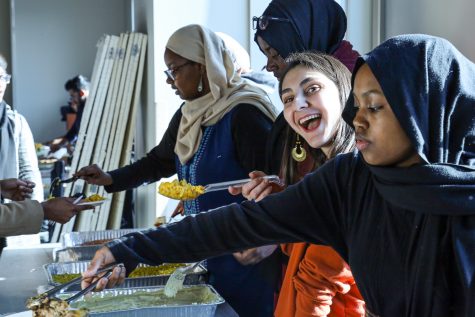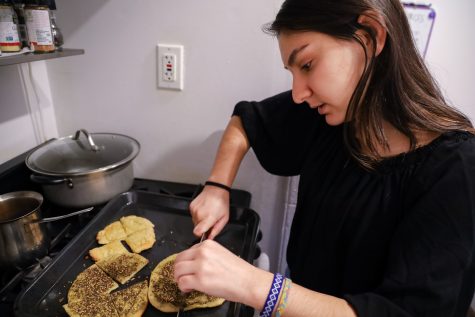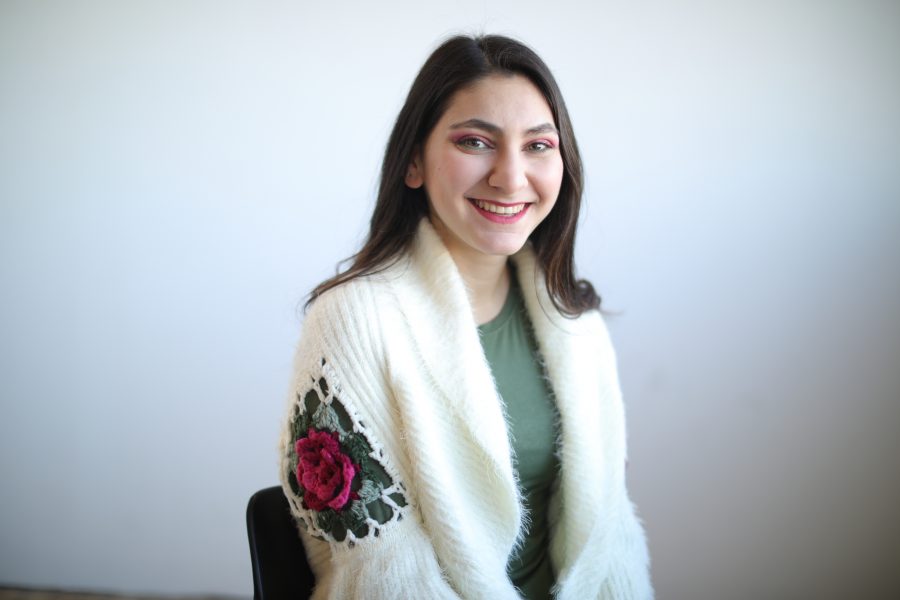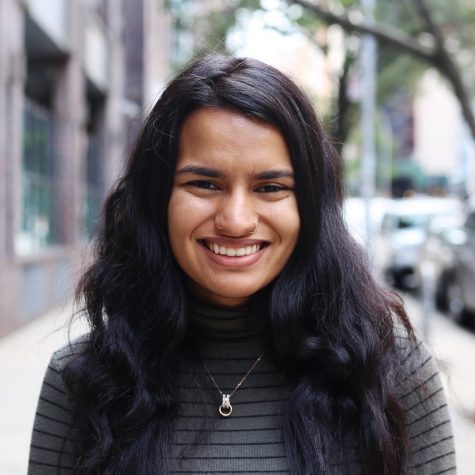On one of the first cold Tuesdays of the year, the Muslim Student Association’s mentorship event had a low turnout, but even with only 30 of the 100 or so members present, you can still tell that this club is more than just one to boost up your resume. Three tables are filled with students from every grade, talking and laughing as if they’ve known each other forever. It actually takes me by surprise when, after chatting for 20 minutes, one person at my table asks the other his name; it’s hard to believe that the two didn’t already know each other.
“We don’t really have [weekly] meetings, we have these random events,” CAS junior and MSA member Reham Perry said. “But I still see these people every day. The fourth floor in GCASL is the prayer room, and all of us have this tendency to just go there when we have a break.”
At the helm of all of this is Tandon senior and Muslim Student Association President Maha Hashwi. Even though she’s one of the few members who isn’t wearing the hijab, it’s hard to distinguish her from the other members of the MSA, especially when she sits at one table and takes pictures with her friends. It feels like this is because it’s one of the most diverse groups of Muslims I’ve ever seen: there are women who are wearing hijabs and women who aren’t, people with accents and people without, all talking like they don’t even notice the differences between one another.

Maha stands up to tell everyone that they need volunteers to participate in the Union Square Park Greenmarket Rescues, an event in which volunteers help “rescue” seasonal produce from farmer’s markets and distribute them to families in need. She goes up to the front of the room and suddenly becomes the president again — her voice reaches everyone, even those deep in conversation. After her announcement, she walks around to each table to help collect sign-ups, confidently convincing those who seem a little hesitant to participate.
Maha has been a member of MSA since her first year. Last year, she was the association’s treasurer, and was voted into the position of president at the end of the spring. This year, the student organization has been able to raise $70,000 during the club’s annual Charity Week, which takes place during the second week of October. Maha is also responsible for creating the first Middle Eastern North African graduation last year through the Center for Multicultural Education and Programs. To her, organizing events like these is a very important part of her faith.
“The community in Islam matters a lot,” Maha said. “Being Muslim is not just about praying all the time, or fasting. A huge part of it is being a good person, or giving more than what you have and believing that it will come back to you.”
As the event winds down, Maha and the rest of the e-board stay back to have a meeting about upcoming events. She carefully picks up all the trash from the ice cream they had passed out at the beginning of the night. When she first came to NYU, Maha never expected to find such a huge community of Muslims on campus, but after her first event, a Muslim parents meet and greet, she was sold.
“My first year, the reason I would come to Manhattan was because of the community,” she smiled. “I spent all of Welcome Week on this campus, so much so that I missed my orientation.”
The next day, a five-floor walk-up brings me into Hashwi’s two-bedroom apartment in StuyTown. Her bedroom is decorated with memories from Charity Week; a poster that she bought during the club’s auction night hangs next to her bed, and a painting of the Arabic word for God is right above her door. She hurriedly makes tea in the kitchen while we talk about Taylor Swift. Maha’s a huge fan; she even met her favorite singer at a concert in Canada with her cousin last year.
The youngest in her family, Maha grew up with three older brothers in Dearborn, Michigan, a city known for its large Muslim population. However, after fifth grade, her and her brothers received scholarships to attend a private school 30 minutes outside of Dearborn. Suddenly, she was the only Muslim in her grade.
“Even though people came from different parts of Michigan, they all came from the same community,” Maha said. “And even though it was a great community, I never got to touch my Muslim side when I was there.”
In New York, reminders of her family in Dearborn are presented in food she serves us: her mother’s homemade bread sprinkled with za’atar, a common Middle Eastern spice mixture. She serves us Alwazah tea, a slightly sweet tea that she drinks everyday. Her mom sends her packages of it from a local market in Dearborn — it’s harder to locate the specific brand she likes in New York City.
“I should send a picture to my mom,” she joked. “She’s going to be so happy that someone is eating her food.”

Even though she lives in Manhattan, Maha takes most of her classes on the Tandon campus. She’s a Sustainable Urban Environments major. Originally an environmental engineering major, Maha chose to switch because Sustainable Urban Environments combined her interest in social justice, activism and environmentalism.
“My focus and interest has always been on environmental and social justice, together,” Maha said. “My goal is to work with communities to try and speak for them, with them and help them. I don’t know what that means for me, but I know that’s what I want to do.”
In her daily life, Maha makes sure to keep up practices that benefit the environment. Even in her tiny apartment, she is able to compost by freezing food scraps and bringing it to the Union Square Greenmarket at the end of every week. During her sophomore and junior years, she lived in the Green House at Seventh Street Residence Hall, known for its environmentally friendly measures. While she believes that the decisions she makes as an individual are important, she’s aware that there are bigger, more systematic problems that have to be addressed.
“There’s this pressure put on people individually to change even though there’s these bigger problems,” she elaborated. “And we’re not holding corporations accountable; instead we’re putting pressure on each individual person.”
During Charity Week, the Muslim Student Association was able to raise money through the Islamic Relief Fund, an international organization that focuses on raising money for poverty-stricken countries. Fundraising ranges from helping orphans of war-torn countries to providing clean water and sanitation to places such as Pakistan and Syria.
Being able to raise so much money this year was one of the main goals of the MSA, and Maha attributes a lot of the success of Charity Week to the Muslim community in New York City as a whole. The strength of her community has played a huge role in allowing her and the MSA to raise these funds and to give back to those less fortunate.
“The Islamic Center has been here for years, and they know what it’s like to not be supported in New York City,” Maha said. “Just having an Islamic Center and a prayer room is huge — not a lot of schools can say they have that. We are very aware that our large Muslim Student Association can do much more than smaller ones because we have this community.”
Even before Maha was elected, former president and 2019 CAS graduate Omer Malik noted that she was a key figure in the MSA.
“She was my right hand, and by being that, she learned all of the technicalities and responsibilities of the role,” Malik wrote in an email. “She was the first person I’d talk to about anything regarding the MSA. I trusted her and her judgement. She played a big role in not just being treasurer, but counseled me as well. She was determined to go beyond her role by learning about the presidency because she knew she had to be ready if she was elected.”
And when it comes to leadership, Malik believes Maha’s strengths are ones that he’s seen in the past MSA presidents that inspired him.
“It’s a love for this space and the people in it,” Malik stated. “It’s a type of love that brings people together, it’s infectious — everyone around that person feels warm, welcomed and seen.”
Reading Malik’s statement a week later, I can’t help but smile at his accurate description of her; I was reminded of when she noticed my cup of tea was empty and immediately offered me more — when I refused, she smiled slightly.
“If I made more, would you take some?” she asked gently. I nodded sheepishly, impressed she immediately recognized that I was just trying to be polite.
For Maha, being the president of an organization that does such incredible things is not just about the status or the title; it’s about the statement she makes by simply being a woman of faith in a world that often portrays Muslim women opresssed and subordinate.
She explores this in her spoken word poetry, which she performs during Fall Welcome Week as part of NYU Portraits. The poem she performed last fall centered around a question she gets asked a lot: why she doesn’t wear the hijab.
“I tell them what my mom taught me: that everyone wears it at a different time, and it is not yet my time,” she recited. “It’s a decision I have yet to make.”
It’s questions like these that remind Maha about the work that still needs to be done in terms of educating others, and to her, simply putting herself out there shows people that there are so many ways to show your faith as a Muslim.
“I was kind of shocked that people voted me into [the MSA] even though I don’t wear the hijab,” Maha said. “I had to think about, ‘what does that mean to my community, and to Islam?’”
Even if she does not act or behave exactly like she’s expected to Maha knows that her faith guides her decisions to take on so many roles within NYU.
“I feel like everything I’ve been doing now is to give back to the people that showed it to me, whether that’s a tour guide that doesn’t even know me or the MSA president I became really close friends with,” Maha said.
In Maha’s tiny bedroom, there’s an album filled with polaroids next to the window. She flips through them proudly, stopping at a picture she took at her brother’s wedding, and a series of photos of her and her mom in a sunflower patch. The album is also filled with pictures of her community in New York, including members of the MSA.
While she’s reminiscing out loud, it’s clear that these pictures serve as lifelong reminders of the communities that she has helped build — a reminder of who she is, where she came from and everything she stands for.
Email Mansee Khurana at [email protected].
























































































































































